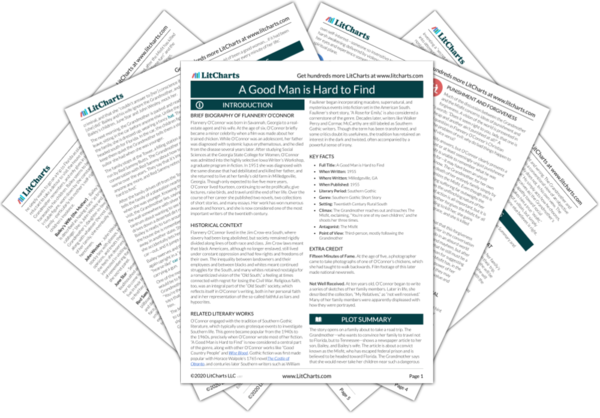The characters of “A Good Man is Hard to Find” live by a variety of moral codes, and both the story’s title and the Grandmother’s conversation with Red Sam bring up the idea of goodness, and what makes a “good man.” In the end, as the Grandmother still insists that the Misfit—who has just murdered her entire family—is a “good man,” the question lingers: does being “good” depend on one’s internal character or external actions? Or does it depend on something else entirely?
The Grandmother seems to believe that being a good person means being honest, respectful, and polite. She tells Red Sam that he is a “good man,” even though all she has seen of him is that he puts on a show of friendliness and easy nostalgia in order to help his business. The Grandmother also laments that the family can no longer leave their screen door open without fear of theft—as they used to, apparently. She blames, somehow, Europe for her own country’s decay, and criticizes Europeans for spending too much, as frugality seems to be another part of her criteria for decency. Speaking to the Misfit, she repeatedly insists that he would never shoot an old lady. Her sense of goodness is so based on traditional morals (and just tradition) that, even in the face of cold-blooded murder, she thinks that her old age and “respectability” will prevent the Misfit from harming her.
To the Misfit, however, the question of what makes a good man seems utterly irrelevant. He claims to have always known that he was not a good person, that he was always different from his sisters and brothers. He views crime casually—a way to make the most of his limited, pointless time on Earth. Other than when he is talking to the Grandmother, he does not seem to compare himself against any standard of good character—and thus he does not consider himself morally inferior or wicked. Instead, he simply does what he wills.
O’Connor does not attempt to answer what true “goodness” is, but rather adds complexity to the question itself. By presenting different and even ironic models of a “good person”—the Grandmother, Bailey, Red Sammy—she makes the reader feel the difficulty of the question, and the ambiguity of morality itself. Then, cutting through the heart of the issue entirely, she brings in the Misfit, whose very existence threatens the validity of any kind of objective “goodness.” O’Connor’s purpose is not to answer such questions, but to dissolve them: to make us more aware of how verbalized concepts and platitudes cannot touch the true mysteries of existence.
Goodness ThemeTracker

Goodness Quotes in A Good Man is Hard to Find
Her collars and cuffs were white organdy trimmed with lace and at her neckline she had pinned a purple spray of cloth violets containing a sachet. In case of an accident, anyone seeing her dead on the highway would know at once that she was a lady.
“Let’s go through Georgia fast so we won’t have to look at it much,” John Wesley said.
“If I were a little boy,” said the grandmother, “I wouldn’t talk about my native state that way. Tennessee has the mountains and Georgia has the hills.”
“Tennessee is just a hillbilly dumping ground,” John Wesley said, “and Georgia is a lousy state too.”
“Oh look at the cute little pickaninny!” she said and pointed to a Negro child standing in the door of a shack. “Wouldn’t that make a picture, now?”
The grandmother said she would have done well to marry Mr. Teagarden because he was a gentleman and had bought Coca-Cola stock when it first came out and that he had died only a few years ago, a very wealthy man.
“A good man is hard to find,” Red Sammy said. “Everything is getting terrible. I remembered the day you could go off and leave your screen door unlatched. Not no more.”
“I know you’re a good man. You don’t look a bit like you have common blood. I know you must come from nice people!”
“Nome, I ain’t a good man,” The Misfit said after a second as if he had considered her statement carefully, “but I ain’t the worst in the world neither. My daddy said I was a different breed from my brothers and sisters. ‘You know,’ Daddy said, ‘it’s some that can live their whole life out without asking about it and it’s other has to know why it is, and this boy is one of the latters. He’s going to be into everything!’”
“I never was a bad boy that I remember of,” The Misfit said in an almost dreamy voice, “but somewhere along the line I done something wrong and got sent to the penitentiary. I was buried alive.”
“Well then, why don’t you pray?” she asked trembling with delight suddenly.
“I don’t want no hep,” he said. “I’m doing all right by myself.
“Then it’s nothing for you to do but enjoy the few minutes you got left the best way you can—by killing somebody or burning down his house or doing some other meanness to him. No pleasure but meanness.”
“She would have been a good woman,” The Misfit said, “if it had been somebody there to shoot her every minute of her life.”
















